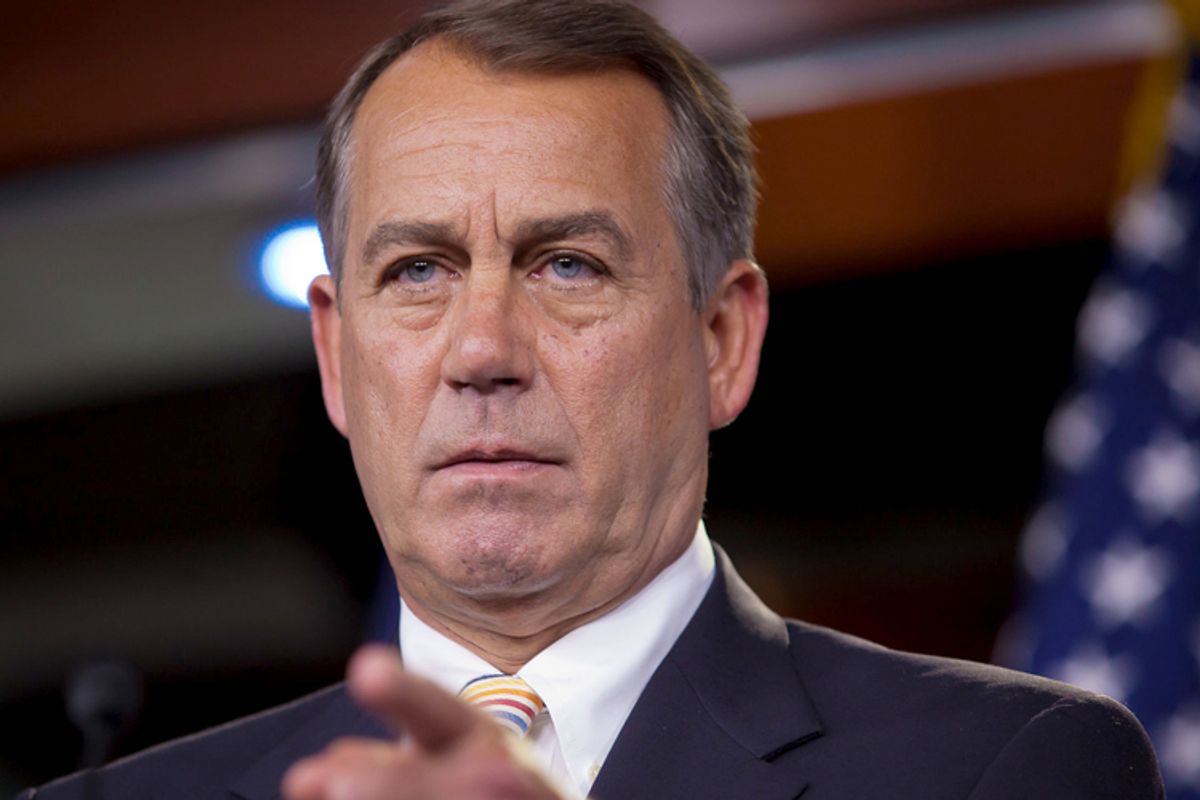How much blame does John Boehner deserve for the shutdown of the federal government? A common narrative in recent months has been that he is a weak speaker who has failed to rein in hard-line Republican House members, especially in the Tea Party’s ranks. Radical congressmen make uncompromising ideological demands, the narrative goes, thereby forcing Boehner to take inflexible stances he does not really believe in, including the government shutdown. What most commentators tend to overlook is that Boehner himself has helped foment the radicalism of the modern Republican Party.
For years, he has made fiery declarations promoting the visceral animosity of numerous Republicans to the Obama administration. “Your government is disrespecting you, your family, your job, your children,” Boehner illustratively said in a 2010 speech, a year before he became speaker of the House. “Your government is out of control. Do you have to accept it? Do you have to take it?” Boehner answered his own question: “Hell no, you don’t!”
Before the passage of the Obama administration’s healthcare reform in 2010, Boehner likened the law to “Armageddon,” the biblical apocalypse, and said it was a “monstrosity” that would “ruin” America. Interviewed on "60 Minutes," he was literally moved to tears when explaining his desire that children continue to “have a shot at the American Dream” despite the menace posed by Obama’s policies (see the 6-minute mark of this video). Still in 2010, the year the GOP took back the House, Boehner warned that “we will not compromise on our principles.” He even explicitly noted that he rejects the word “compromise.”
Some commentators argue that Boehner has just been pandering to the Tea Party, yet this point overlooks how he already took hard-line stances well before the Tea Party movement came into existence. Back in the 1990s, he led a drive to abolish the Department of Education and helped Newt Gingrich craft the “Contract With America.”
Boehner is among the affluent persons who have favored “winner-take-all” economic policies while pretending to defend working-class and middle-class Americans. He assures that he headed a “small business” prior to becoming a congressman in 1991. His wife also stresses that the Boehners are “just normal, average people.” In reality, he made millions while running a marketing firm. As a congressman, he distributed checks from tobacco lobbyists to fellow legislators on the floor of the House itself. Close ties to lobbyists later helped him become speaker of the House.
While he has had a tense relationship with Tea Party-aligned congressmen, who have accused him of being overly compromising, he largely shares their worldview, long backing the kind of radical laissez faire policies embraced by the Tea Party.
On global warming, he has echoed the scornful skepticism of scientific research that is relatively ordinary among contemporary Republicans — unlike among conservatives elsewhere in the industrialized world, many of whom identify climate change as a man-made problem. For example, he described the notion that carbon dioxide emissions are harmful to the environment as “almost comical” and emphasized that cows emit carbon dioxide too.
In other words, there are reasons to doubt the common notion that a clear dichotomy exists between Boehner and the most radical members of the House, who are mainly faulted for spurring the government shutdown. By both American historical standards and international standards, it is the modern GOP that is hard-line, not just its Tea Party faction. This peculiarity is epitomized by the adamant opposition of virtually all Republicans to universal healthcare, which is widely accepted by all leading right-wing parties in Europe, Canada, Australia, New Zealand and Japan.
There’s no denying that Boehner is relatively moderate compared to certain members of the Republican base, such as the sizable segment convinced that the first African-American president is a covert Muslim with a fake U.S. birth certificate. Yet, he refused to reason with these elements. In particular, he was asked on "Meet the Press" whether he has the “responsibility to stand up to that kind of ignorance” in his party. “[I]t’s not my job to tell the American people what to think,” Boehner responded in an effort to curry favor with the conspiracy theorists.
For the sake of argument, even if Boehner were just pandering all along with all of his incendiary declarations, that would not change the fact that he helped foment the Tea Party’s rise. Assuming that he did not really believe his own hyperbolic excoriation of Obama, many citizens were certainly prepared to perceive Obama as a grave threat to “freedom” and “liberty.” The irresponsible and alarmist statements of influential officials like Boehner have contributed to galvanizing the Republican base. From that standpoint, he played with fire and helped instigate the “rebellion” of the radical congressmen who have undermined his tenure as speaker.
Last but not least, the notion that the most conservative elements of the House are solely responsible for the government shutdown overlooks Boehner’s brinkmanship throughout the crisis. He notably rejected a plan by House Majority Leader Eric Cantor that would have enabled the Senate to symbolically vote on defunding the Affordable Care Act without tying that issue to the overall funding of the government, which would have averted a shutdown. And today he refuses to place a clean Continuing Resolution on the floor for a vote -- one that likely has enough votes to pass and would end the shutdown. Surely, Boehner faces pressure from within his party, but it was ultimately his choice to endorse a crippling shutdown of the federal government as a political strategy. He is no victim.



Shares